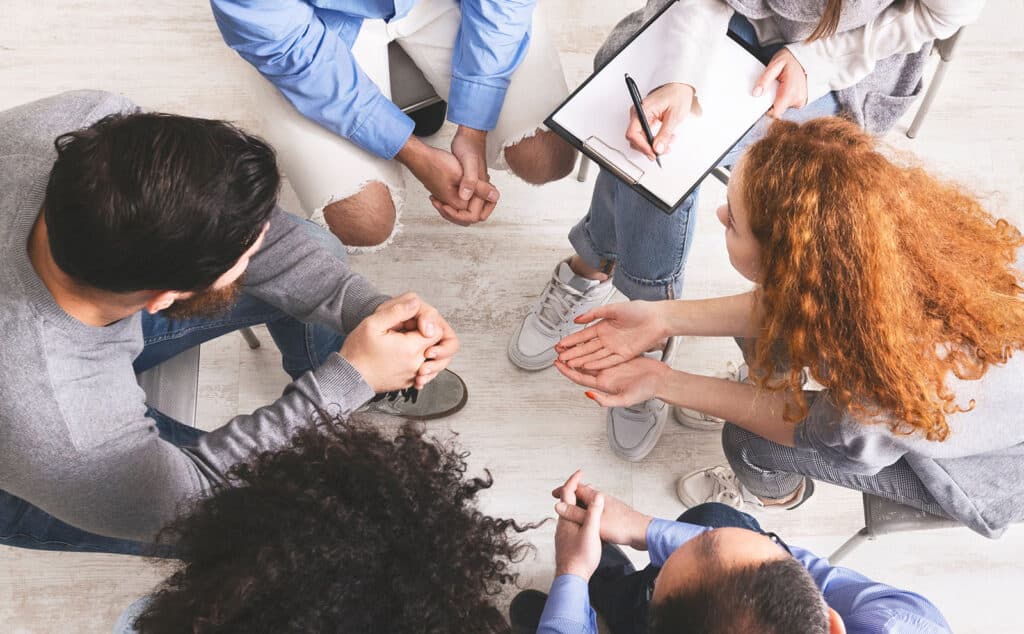Addiction has never been more prevalent and dangerous in the United States than it is right now. According to the National Center for Drug Abuse Statistics, 50 percent of all individuals aged 12 and older have tried at least one illicit substance within the last 12 months. Since 2000, there have been nearly 700,000 overdose deaths, and 70 percent of the individuals who use an illicit substance before the age of 13 will develop substance use disorder. There are also higher instances of extremely dangerous drugs being sold across the US. The most prominent is fentanyl. However, new drugs, including ISO (Isotonitazene) and Xylazine, are also being mixed into heroin, cocaine and other types of street drugs. While fentanyl and ISO do respond to Naloxone because they are opioids, Xylazine cannot be reversed with Narcan. Because of the prevalence of newer, more dangerous illicit substances, 2021 experienced the highest rate of overdose deaths. According to the DEA, 108,000 people died from overdoses, and 75 percent of those deaths occurred from synthetic opioids. Because of the high risk of overdosing on today’s street drugs, it’s never been more important to seek help at a reputable treatment center, like Miracles Recovery in Florida. Let’s take a look at the scope of addiction in the state and how treatment can help you.

Table of Contents
Understanding the Scope of Addiction in Florida
Florida is not immune to the drug crisis plaguing the United States. In 2021, there were 8,093 overdose deaths, and Emergency Medical Services responded to 105,490 overdose calls, according to Florida’s Substance Use Dashboard. In 2022, Naloxone was administered 51,752 times, and there were 68,564 drug arrests.
Most Commonly Abused Drugs in Florida
Florida has a high rate of opioid use. However, many other illicit substances are also used within the state, including cocaine, MDMA and Meth. In addition to those substances, individuals should also be aware of many of the newer drugs that have made their way onto the streets, including:
- Flakka or bath salts, which can be cut with anything, including rat poison.
- Kratom, which is an edible leaf that comes from Thailand.
- Spice, which is often sold in gas stations as incense and purchased by teens to smoke.
- Ketamine, which is still popular and often referred to as angel dust, PCP, vitamin K or Special K.
- Smiles, which is a different version of N-Bomb. It is a psychedelic drug that was first noticed in 2003. It’s dangerous because it’s a hallucinogen and an amphetamine. The amphetamine component can lead to overdoses.
How Substance Use Disorder Affects Families
Substance use disorder isn’t only harmful to the person using the illicit substances. It also negatively affects families.
- Families often feel frustrated, helpless and overwhelmed when one of their family members has an addiction.
- The loved one’s addiction often erodes trust within the family unit due to lying, manipulative behavior and even theft.
- The family’s financial stability is often significantly eroded due to the loved one’s continued purchase of illicit substances.
- Family members who are addicted often fail to accomplish their responsibilities. They may not look after the children or be able to hold a job.
- The other family members may knowingly or unknowingly enable the person’s behaviors by giving them money, hiding their actions and making excuses for them.
- Children who grow up in households with addiction are more likely to develop addictions themselves.
Basics of Addiction Treatment
Addiction treatment is often accomplished in stages. The first stage is detoxification, which is when the individual stops using their drug of choice and lets the substance naturally leave their body. Since this can cause unwanted side effects, medication-assisted therapy (MAT) is often prescribed, especially for opioid and alcohol addictions.
The next stage is rehabilitation. This is where the individual undergoes various forms of therapy and education. This can include providing information on addiction and how people become addicted, learning how to change behaviors through cognitive-behavioral therapy and participating in holistic treatment options, including spiritual guidance, yoga, meditation, chiropractic care, exercise and nutrition counseling.
The last stage is aftercare, and it’s the longest stage. To help understand this stage, it’s important to think about addiction as a chronic disease. Once the disease is under control, it takes time and effort to manage the ailment. Aftercare for addiction often involves continuing to go to therapy, taking part in relapse prevention programs and sometimes joining a step-based group in the community.
Inpatient Treatment
Inpatient treatment is an intense form of drug treatment rehabilitation because it involves living inside the treatment center for the entirety of the program. While the individual is in the treatment center, they will receive therapy and counseling as well as other services, like medical supervision and medication-assisted detox. This type of treatment is most often recommended for individuals who have a severe addiction or who have been addicted for an extended amount of time.
Outpatient Treatment
Outpatient treatment does not involve living at the treatment center. Instead, the individual attends treatment and therapy sessions during the day or evening. This works best for individuals who have work, school or family obligations that make it difficult for them to enter an inpatient program because they can still work and return home in the evening to eat and sleep.
Residential Treatment
Residential treatment programs are similar to inpatient in that the individual lives in a residential setting while receiving their substance use disorder treatments. These treatment centers typically feel more like a home, and individuals in the program may have daily chores and responsibilities, which helps them build critical life skills.
Individualized Treatment Options
Many treatment centers have gotten away from rigid programs that don’t offer much in the way of flexibility. This is because research has proven that individualized programs are more effective at treating substance use disorder. Benefits of individualized treatment include:
- The severity and complexity of the individual’s substance use disorder can be taken into account when crafting their treatment program.
- Individual treatment offers the ability to spend more or less time in each stage of recovery, depending on the person’s needs.
- Individuals tend to feel better engaged and motivated during the treatment process.

Overview of Addiction Treatment Programs in Florida
Florida offers a diverse set of treatment options. This makes it easy for individuals who are looking for treatment to choose the right modalities and approaches in the best setting for their unique needs. This means that individuals can choose treatment centers that are based on the coast or further inland, and they can choose from a range of inpatient, outpatient and residential treatment programs. The state even has plenty of sober living homes and halfway houses for individuals who aren’t quite ready to return home. In addition, Florida offers year-round warm weather, which allows individuals who are in treatment to get outside and enjoy nature or various outdoor activities, which can help them reduce stress and relax.
Socio-Economic Reasons to Seek Treatment in Florida
Florida is well-known for its recovery-friendly communities that contain plenty of community support groups and sober living homes. Part of this reason is due to demographics and cultural factors. For instance, Florida has large populations of retirees and Latinos. It’s also close to international drug trade routes, and illicit substances, including heroin and cocaine, can be found in the state. For this reason, treatment centers in Florida tend to offer specialized treatment programs for older individuals and Latinas, who may face barriers to treatment in other locations, and they offer specialized treatment programs for the most common drugs in the state.
Popular Treatment Centers in Florida
Florida is home to many notable treatment centers, including:
- Hazelden Betty Ford Foundation in Naples – Offers residential, outpatient and sober living programs.
- Caron Renaissance in Boca Raton – Focuses on holistic and evidence-based approaches.
- Beachway Therapy Center in Boyton Beach – Focuses on individualized treatment approaches for residential, outpatient and aftercare programs.
- Miracles Recovery in Port St. Lucie – Offers individual, group and CBT therapy along with holistic rehab options.
Key Features of Florida Addiction Treatment Programs
When an individual enters a treatment program in Florida, they’ll be offered a variety of rehabilitation options, including:
- Various Therapeutic Approaches – Individual and group therapy along with cognitive behavioral therapy, motivational interviewing, trauma counseling and life skills.
- Holistic Treatment Options – Yoga, exercise and fitness therapy, music therapy, nature therapy, art and writing therapy and nutrition guidance.
- Specialized Programs – Programs geared for specific groups of people, including senior citizens, teenagers, veterans and LGBTQ+. There are also programs designed for specific genders.
Guidance on Choosing the Right Program in Florida
When looking for a treatment program in Florida, it’s important to consider a few different factors.
- Your Needs – What are your specific needs? Would do you well in a program for men, women, LGBTQ+ or senior citizens? Do you have any particular interests, like Yoga, art, horses or nature? If you find that you desire specific features, there’s a program out there that offers them.
- Program Costs – Various treatment centers tend to offer a variety of payment options, including insurance, sliding scale and self-pay.
- Treatment Center Location – Would you prefer to be near a beach or further inland? Are there areas of Florida you prefer more than others?
- Program Reputation – Make sure the program has a good reputation and solid success rates. You can ask to see program success rates and ask how well clients do after they complete their programs.
- Program Accreditation – Make sure the program is accredited and licensed. This often means they have undergone an evaluation process that determines the safety and effectiveness of their programs.
- Professional Credentials – Make sure the staff members have the appropriate educations, licenses and credentials that pertain to the services they offer.
- Help From Loved Ones – Don’t be afraid to enlist the help of your loved ones. They may see or hear about a program or treatment center that you should evaluate as a potential treatment option.
The Future of Addiction Treatment in Florida
Addiction treatment is always changing due to new scientific evidence. This evidence often leads to better treatment modalities and more effective medications. In the future we expect drug treatment to be treated more like a chronic disease instead of a moral failure, which can cause individuals to feel stigmatized. We also hope to see better treatments and acceptance of individuals with dual diagnosis, which is the presence of substance abuse disorder alongside a mental illness. Better acceptance and research on dual diagnosis can help individuals with co-occurring disorders better overcome and manage their conditions.
If you need help overcoming your substance use disorder, there is help available at Miracles Recovery in Port St. Lucie, Florida. At our treatment center, you can stop using your drug of choice and receive various therapies in order to help you heal. We even offer holistic treatment options.
To learn more about how we can help you, give us a call today.
Related
- Rehab For Seniors in Port Saint Lucie, FL
- Rehab For Women in Port Saint Lucie, FL
- Mens Addiction Treatment in Port Saint Lucie, FL
- Long-Term Drug Rehab in Port Saint Lucie, FL
- Evening Intensive Outpatient Program in Port Saint Lucie, FL
- Young Adult Drug Rehab in Port Saint Lucie, FL
- Intensive Outpatient Program in Port Saint Lucie, FL
- Outpatient Treatment in Port Saint Lucie, FL
- Partial Hospitalization Program in Port Saint Lucie, FL

